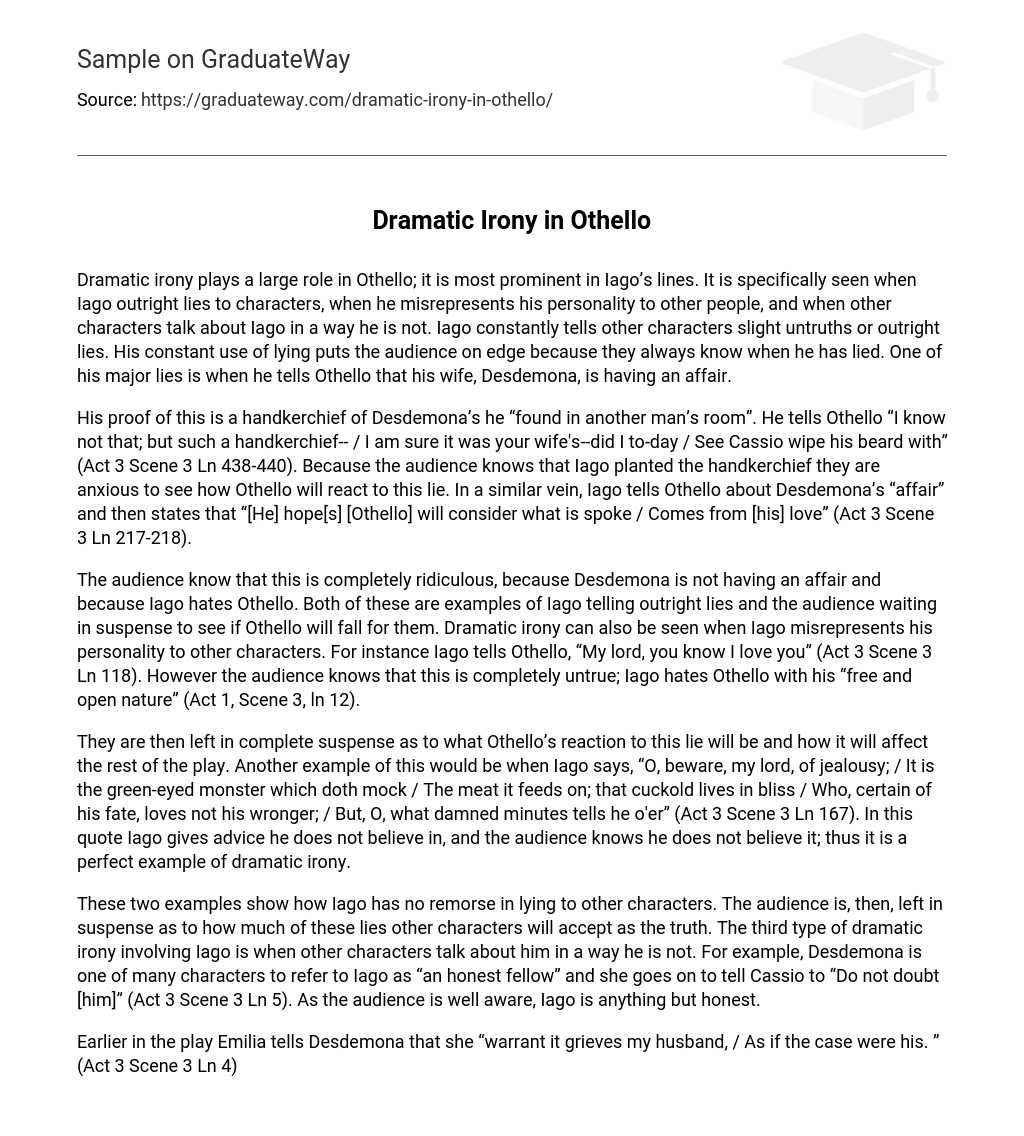One of the prominent elements in Othello is the use of dramatic irony, particularly in Iago’s dialogues. This technique is prominently displayed when Iago tells outright lies to deceive other characters, portrays himself differently to manipulate others, and when other characters discuss him in a manner that misrepresents his true nature. Iago consistently fabricates small untruths or outright lies to deceive those around him. The audience is constantly aware of his deceitful nature, adding suspense to the play. A significant lie that Iago tells is when he falsely claims that Desdemona, Othello’s wife, is having an affair.
The evidence that supports his claim is a handkerchief belonging to Desdemona that he discovered in another man’s room. He informs Othello, “I am not aware of that, but I did see Cassio wipe his beard with a handkerchief today – I am certain it was your wife’s” (Act 3 Scene 3 Ln 438-440). Since the audience is aware that Iago planted the handkerchief, they eagerly anticipate Othello’s reaction to this falsehood. Similarly, Iago informs Othello about Desdemona’s supposed “affair” and then adds, “I hope you will consider that what I am saying comes from my love for you” (Act 3 Scene 3 Ln 217-218).
The audience is aware that the situation is absurd because Desdemona is not having an affair and Iago despises Othello. These instances demonstrate Iago’s blatant lies and leave the audience in suspense, wondering if Othello will believe them. Furthermore, dramatic irony arises when Iago deceitfully presents himself differently to other characters. As an example, Iago assures Othello, “My lord, you know I love you” (Act 3 Scene 3 Ln 118), even though the audience knows this is entirely false due to Iago’s intense animosity towards Othello and his genuine “free and open nature” (Act 1, Scene 3, ln 12).
The audience is left in suspense about Othello’s reaction to the lie and how it will impact the play. Another example of this occurs when Iago warns Othello about the dangers of jealousy, stating that those who are aware of their fate can avoid being hurt by their wrongdoer. The audience is aware that Iago does not believe his own advice, thereby creating dramatic irony.
The text highlights two instances where Iago deceives other characters without feeling any remorse. This leads the audience to wonder how much of these lies other characters will accept as the truth, creating a sense of suspense. Another form of dramatic irony related to Iago occurs when other characters discuss him in a manner that contradicts his true nature. For instance, Desdemona, among others, describes Iago as “an honest fellow” and advises Cassio not to doubt him (Act 3 Scene 3 Ln 5). However, the audience knows that Iago is far from being honest.
Emilia informs Desdemona in an earlier scene that her husband is deeply troubled by the situation and treats it as if it were his own (Act 3 Scene 3 Ln 4). This statement, along with the previous line mentioning Iago, exposes the audience to the fact that the other characters have a completely false perception of Iago. Much of the dramatic irony in Othello arises from characters misunderstanding Iago’s true intentions. This creates suspense for the audience as they are aware that Iago desires the downfall of everyone else.





